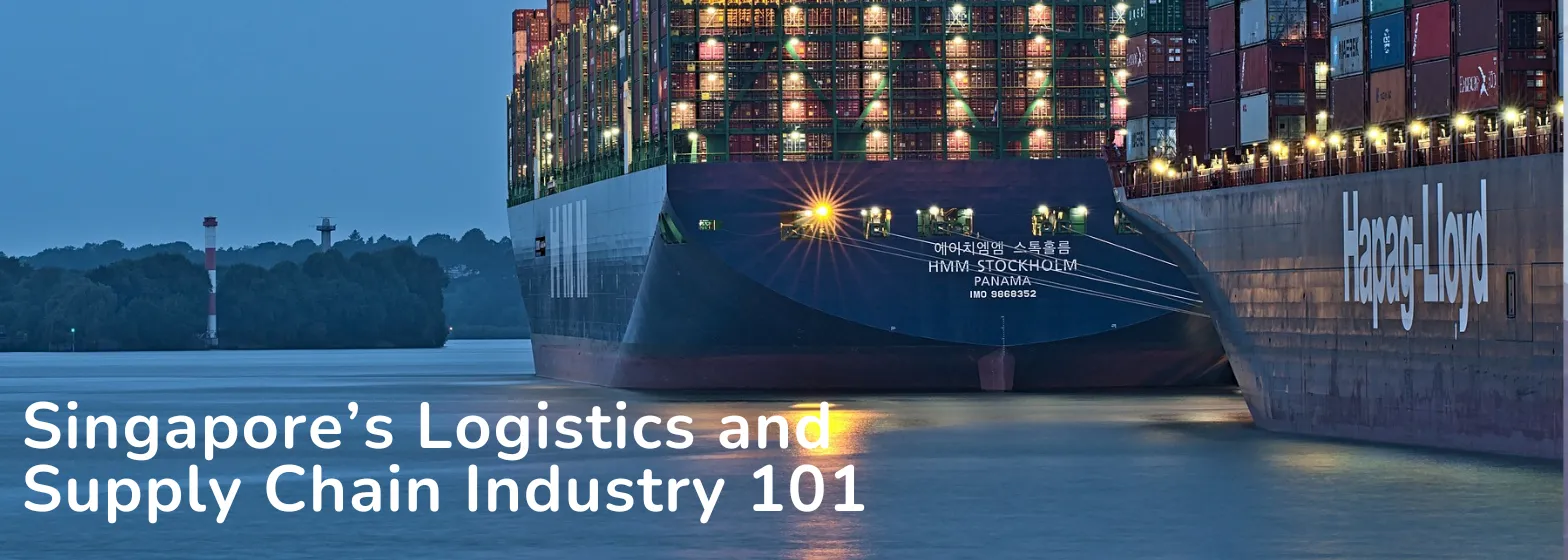About Singapore’s logistics sector
According to recent market reports, Singapore’s logistics market is valued at over S$25bn. Industry experts are excited over the government’s focus on sustainable technologies that will come online at the new Tuas Port, which is scheduled to be fully completed in 2040, and will become the world’s single largest container port.
Overall, there’s a rosy hiring outlook for logistics, with ManpowerGroup reporting in December 2023 that the transport, logistics and automotive sector topped a list of 9 sectors that were planning on increasing hiring in 2024. These sectors were also most likely to give larger bonuses, according to the 525 Singapore employers surveyed.
Size of the job market
The aftermath of COVID-19 has driven much of the buzz in the logistic sector, which has led to countries focused on strengthening their own food security and supply-chain capabilities. According to Ministry of Manpower statistics, more than 256,000 people work in transportation and storage services.
The logistics sector has been hiring, with British international recruitment agency Robert Walters’ Salary Guide for 2023 earmarking jobs in the industry as highly sought after.
It also made the following findings for the sector:
- The roles in highest demand include global logistics managers, category managers, and leadership roles for supply chain and procurement centres of excellence.
- The technical skill sets sought after in the logistics industry include proficiency in SAP, Tableau, SQL, Power BI, and AutoCAD for designing warehousing solutions, and master data management.
- Employers are looking for skills in business analysis, contract negotiation, digital transformation and automation, 3PL and vendor management, or process and continuous improvement frameworks.
- Those who move into the industry can expect an increment of 15-20% for permanent roles.
- 88% of logistics-linked businesses are offering pay raises, while 67% of industry professionals expect one this year.
Why is this sector important to Singapore’s economy?
Investment has poured in to build more cold-chain facilities, such as the S$200m spent by local investment Commonwealth Capital and Japan’s food-and-beverage (F&B) cold-chain specialist Kobuku Group.
With a total floor area of 500,000 square feet and a cold storage capacity of up to 80 million kg of goods, it is set for completion in 2025.
Minister of State for Trade and Industry Low Yen Ling said such facilities will make Singapore a focus point as a trade and logistics hub, and the country is expects to increase its stake in the cold-chain perishables market.
“Increasing demand from Asia for imported perishables and food security concerns will drive the need for cold storage to extend the shelf life of food products.”
Associate professor Mabel Chou, Department of Analytics and Operations, at NUS Business School, shared: “Due to the recent disruptions around major global supply chains such as China, many global companies are reassessing their supply chain resilience to ensure diversification of supply chain.
“Many firms are adopting a “China + 1” strategy and moving part of their production to Southeast Asia as a diversification. Due to the structural changes of the industries and the slowdown in China’s economy, Chinese firms are also looking to diversify part of their production bases to Southeast Asia as well.
“In the short term, there will be increased competition for logistics talent, particularly for those who have strong expertise and experience in Southeast Asia.”
Growth sectors and outlook for the banking and financial services sector
Professor Chou revealed that many logistic firms have embarked on warehouse automation projects, such as Automated Storage and Retrieval Systems (ASRS).
She added: “New sectors requiring different logistics skills have emerged, including the proliferation of online retail channels and cold chain.
“These sectors require operational expertise and infrastructure different from the conventional logistics.”
Unlike in the past, workers in the logistics industry in the future need to understand and operate automated machines such as sophisticated ASRS and mobility robots such as Kiva Robots, according to Professor Chou.
Ultimately, managers will need to be trained to understand and use big data, both in terms of analysis to understand trends and to predict failures or changes in the supply chain.
Logistics professionals will need to further their understanding of supply chain practices of the Southeast Asia region and their challenges and limitation to incorporate these inputs when constructing and planning regional supply chain networks.
Professor Chou added: “Workers of the logistics industry need to raise their IT capabilities and their tech savviness to stay relevant and employable in the logistics industry.
“This will require a constant upgrade through short skill-based training courses in these topics, coupled with constant exposure of the new settings in the region, so that they can have the right skills and understanding to add value to the companies or clients that they are serving.”
Mid-career switch: Why is the logistics sector a good choice?
Non-PMET roles also show good salaries and opportunities for those who move into the industry.
Speaking to Channel NewsAsia, Thiban Mahaindran shared that he managed to triple his salary by moving into the logistics industry.
Previously working as a mechanic earning around S$1,800 a month, he learnt from a prime mover driver whose truck he had inspected that, with his Class 3 and 4 driving licence, he could join the logistics industry and earn S$5,000 monthly instead.
The next day, he quit his job and became a prime mover driver instead. This was eight years ago, and currently, he is the head of transportation at Asian Worldwide Services (AWS) Singapore and manages a fleet of ten prime mover drivers himself.
One of Thiban’s drivers, Prem Kumar, 28, shared he has been earning around S$5,000 since he began driving six years ago.
Another driver at AWS, Meghan, had just begun driving a few months ago and estimated in December 2022 that his salary for that month would hit S$4,200. Like Thiban, their highest qualification is an ITE certificate.
The industry aims to attract more women to join the sector and is willing to redesign job tasks and work arrangements to accommodate their needs.
In Aug 2022, 10 logistics and supply chain firms signed memorandums of understanding (MOUs) with labour movement NTUC.
They pledged to implement progressive workplace policies and review their flexible work arrangements, redesigning job roles and providing training for female workers to take on jobs in the sector.
Mr Dave Ng, group chief executive of logistics firm Bok Seng Logistics, said in a Straits Times report: “One area would be in the warehouse, let’s say, the job of a stock picker, which you do not need to have fixed working hours for.”
He shared that technology and effective scheduling can allow women workers to work on picking out stock and packing shipments together whenever they can.
Types of jobs in the logistics sector
The types of jobs available in the logistic sector can suit many workers of different skill sets and professional backgrounds. Jobs in logistics can also be as in-house employees or working for third-party vendors and companies that handle outsourced logistic services from other businesses.
Work conditions are also improving as logistic companies in Singapore are shifting to providing higher-value services, according to a report by the Straits Times.
Virtual cloud-based software lets workers guide company operations, check shipment data, and look up internal procedures remotely, allowing more flexible work arrangements. Of course, certain roles, like drivers and warehouse workers, will still need to maintain a physical presence.
Some of the key areas in the logistics sector that hire include:
- Customer Service
- Procurement
- Warehousing
- Storage
- Inventory
- Transportation
Available roles are also varied, ranging from:
- Air cargo officer
- Logistic maintenance planner/administrator
- Cybersecurity specialists
- System engineers
- Data analysts
- Warehouse manager
- Inventory manager
- Demand and procurement planners
- Supply chain managers
- Fleet and transportation planners
What’s the salary like in the logistics sector?
Jobs in the banking and financial services sector cover a broad spectrum of roles, and salaries vary depending on the specific job function, level of experience, and qualifications.
Here are some examples listed on the MyCareersFuture portal:
| Role | Salary Range (Monthly) |
| Logistics Manager | $7,500 to $8,500 |
| Purchasing Manager | $9,000 to $16,000 |
| Warehouse Assistant | $2,300 to $2,800 |
| Sales Manager | $8,000 to $15,000 |
| Business Analyst | $5,000 to $7,000 |
| Warehouse Management Specialist | $5,000 to $8,000 |
| Truck Operator Driver | $1,500 to $3,500 |
| Shipping Documents Manager | $4,000 to $5,000 |
| Fleet/Construction/Transportation Manager | $4,000 to $7,000 |
| Class 4 Logistic Driver | $3,500 to $4,500 |
What courses or skills are needed to join the logistics sector?
The professional services industry is vast and offers opportunities at every level. If you lack the necessary skills or experience, sign up for relevant Skillsfuture courses to prepare you for the job role you’re interested in.
Wondering what employers are looking for? The Robert Walters report showed there’s demand for employees and workers with particular skills in:
- Business analysis
- Contract negotiation
- Digital transformation and automation
- 3PL and vendor management
- Process and continuous improvement frameworks.
The technical skill sets sought after in the logistics industry include proficiency in SAP, Tableau, SQL, Power BI, and AutoCAD for designing warehousing solutions and master data management.
Jobseekers or mid-career switchers who are keen on joining the professional services sector can get support and On-the-Job Training by signing up for the following Career Conversion Programmes for Professional Services by Workforce Singapore:
The Career Conversion Programme (CCP) for Supply Chain and Logistics Professionals and Coordinators aims to build a pipeline of workforce with the necessary competencies to take up roles in areas such as:
- Supply Chain Analyst
- Sourcing/Procurement Executive/Manager
- Warehouse Operations Executive/Manager
- Logistics Systems Engineer
- Shipping Executive/Manager
- Material Handlers
- Shipping Assistants
- Fleet Controllers in both logistics service providers and non-logistics companies.
Keen to learn more about Singapore’s logistics industry and how you can jump in? Read more below to find out about the logistics jobs in Singapore!

Here Are the Skills You Need For a Successful Career in Logistics
Do Logistics & Supply Chain Management Interest You? Consider These Roles!
How to be a Supply Chain Manager in Singapore
Singapore’s Supply Chain Industry: Expansion in Job Opportunities
Why a Career as an Operations Manager Will Make You a Valuable Asset in Any Industry
Why a Career in Supply Chain is More Fulfilling Than You Think















